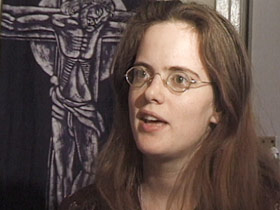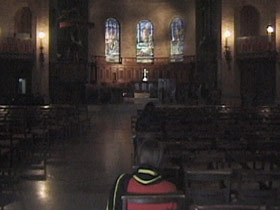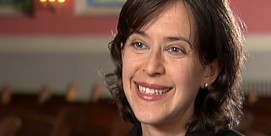In This Episode << SLIDE LEFT TO SEE ADDITIONAL SEGMENTS
Lauren Winner Extended Interview
Below are excerpts from an interview about religious conversions with Lauren Winner:
My parents were the first intermarriage in either of their families. My mother was from a pretty devout Southern Baptist family, although she moved away from that by college. And my father grew up in a classical Reform Jewish household — no yarmulkes allowed in the synagogue, and so on. They both grew up in Ashland, North Carolina, and their first date, I think, was the junior prom.

My mother went to church with her mother on Christmas, but we didn’t go. When I was 11 or 12, which was after my parents divorced and after my mother and I moved to Virginia, I began to be more involved in Judaism just of my own impetus.
Ever since I was a small child, I really believed in God. I really had some unshakable God thing. And I haven’t always been able to be very articulate about it, but I really wanted to harness that and engage it and be in a relationship with God. Everything was to that end. Community really appealed to me, but in part it appealed to me as a way to get to God.
I did formally convert to Judaism. Under Orthodox Jewish law, you’re not Jewish if you’re mother’s not Jewish. So I did convert.
I came to New York City and Columbia University specifically because there is a large Orthodox Jewish community, both in the city and at Columbia — 350 people at a Friday night Jewish Orthodox service on campus. I leapt into that community and was mostly embraced by it. There were a few people in the Orthodox Jewish community who were wary or not respectful of a convert. For most of college, I dated an Orthodox Jewish man whose family was not thrilled that he was dating a convert.
Jewish law dictates what shoe you put on first in the morning, and what types of fabrics your clothing can be. I would get up, and I wouldn’t always make it to the 7 a.m. prayer service. But if I didn’t make it to that service, I would pray at home. For a couple of years I had a morning study partner. We would get up and do our Jewish text study in the morning. I went to class, and I ate kosher food at all my meals, which meant that I didn’t eat at most of the campus establishments. (Columbia does have a kosher dining hall.) Most of my friends in college were in the Orthodox Jewish community. I had one very close friend who was not. And almost all of my extra curricular campus activities were through the Jewish student union. I was on the executive board.
I had always been intellectually interested in Christianity. In high school, even as I was moving personally toward Orthodox observance, I read some Christian theology and history, just because I was interested in religion … and I was studying American history in college. The history of Protestantism is pretty important to American history, and I just loved studying it. I thought it was intellectually fascinating. That was also part of my Southern identity, I think. I loved reading contemporary Southern literature, and there’s a lot of Christianity shot throughout it.
My boyfriend thought I was incredibly incoherent. He just thought I was crazy. The first inkling of actively moving toward Christianity was that I became interested in the doctrine of the Incarnation. I just thought it was really smart that someone had invented this idea of God actually becoming a person so that we can relate to Him better.
At the time, it seemed like this great, brilliant thing; it just was clearly untrue. I could be interested in it; I could study it. But Jesus wasn’t the Messiah. He didn’t do the things the rabbis said the Messiah would do, and that was the end of it.
My sophomore year of college, I had a dream that I took to Be, upon waking up, a dream that came from God and was about Jesus and his reality. In the dream, my friend Michelle, who is one of the women that I studied the Talmud with every week, and I and a bunch of other women (whom I didn’t know in the dream or in real life) were kidnapped by a group of mermaids. We were taken to live underwater with them. After about a year, this group of men came to rescue us. Most of the men were 50-something and silver-haired. There was one beautiful, Daniel Day Lewis-like 30-year-old man. And I knew that he had come to rescue me, and that while he was there he would participate in the collective rescue effort. But he came to rescue me.
And that was it. I woke up, as certain as I had been of anything before or since that this dream was about Jesus. Jesus was this man.
I told the dream to three people: my Orthodox Jewish roommate, my Orthodox Jewish boyfriend, and one Christian friend. The Orthodox Jewish roommate said, “Oh, you must have been dreaming about Elijah the prophet,” which I thought was a close interpretation but not quite there. My boyfriend thought I was dreaming about another man and got very upset. And my Christian interlocutor said, “Whom do you think you might have been dreaming about?” I thought, “Well this is ridiculous if she doesn’t get it. I understand why my roommate and my boyfriend don’t get it, but surely she gets it.” So I said, “Well, I think that I was dreaming about Jesus.” And she said, “That’s clear to me, too. I just didn’t know if you would be able to see that, given that you are an Orthodox Jew.” And in a certain way she was right, because nothing happened. I ignored the dream. In fact, I actively fled from this knowledge for a few years. It did not fit into my life. I was engaged in this Orthodox community; my identity was very much about that. I was gradually getting my family accustomed to this fact. I was very much in love with this Orthodox man. So there was not a lot of room for Jesus in that life. That is the dramatic moment. There isn’t much drama after that.
The colossal theological hindsight is that I was being saved from original sin. I certainly wouldn’t have articulated that then, but I have come to believe something about the exclusive saving power of Jesus.
The summer before senior year, I stumbled upon a novel, Jan Karon’s AT HOME IN MITFORD. I started reading the book in the bookstore. I had vowed not to buy any books that day, but I got hooked and bought it and the sequel, and left the bookstore with my friend. That next week, when I was meant to be working on graduate school applications, I read those two books probably six times and was just hooked by the faith that the characters had. I was really compelled. These are not literary novels; they are not great novels. But the characters had a faith that I was drawn to.
I was envious. I felt that for several years I had been locked in a commitment that I took very seriously. And I was constantly struggling to keep taking seriously the commitment to Orthodox Judaism. These characters had difficulties; they had problems, but not many of them had very many doubts, which is a failing of the book. But they seemed to have a fundamental serenity.
I read the novels and began to think I really needed to pursue this in some way. I went to talk to a Columbia chaplain I had known since the beginning of college. I did not know him well, but I knew him a little bit. I called him and said, “I need to meet with you and talk about some things.”
He was a Presbyterian minister. We met at a cafe, and I said, “I’m really thinking a lot about Jesus. I feel that I’m being called in some way to move toward that. I don’t really know what to do.” His response was, “When you converted to Orthodox Judaism, you entered a marriage you can’t get divorced from. So you’re kind of stuck.”
I felt like I’d been punched in the stomach. I was really put off by that response, and I have not spoken to him since.
I don’t know if I can date it to that evening. But that was really the moment when I began to understand that this was something I really had a personal stake in, and I really had to do this. I had to do this with my life. I knew that I wasn’t going to be able to do it in New York. I didn’t have the personal fortitude to really pursue this in some nondilettantish way in a community where I was known as an Orthodox Jew. That’s what my identity was primarily.
I hadn’t stopped going to synagogue. I had certainly become less consistent. I wasn’t eating shrimp. I was not keeping kosher the way I used to keep kosher.

Then I received a fellowship to go to England for two years. And that was a real gift, because it provided space in a place where almost no one knew me or anything about my background. I didn’t lie about my background, but there just wasn’t a set of expectations.
I thought that the primary purpose of my going to Cambridge was intellectual … but that was not the primary experience. The primary growth, the primary movement was spiritual. On a more superficial level, it was in England that I was baptized. It was in England that I was confirmed. It was in England that I was identifying publicly and consistently as a Christian. It was in England that I learned to pray as a Christian. That was where the ferment was.
Is Hinduism next? I obviously don’t know. I can’t say anything that will convince anyone else of this. There are certainly people out there who think five years from now I may be sitting Zen or something. It’s evident to me that that will not be the case. It’s evident to me that this is where I’ve landed.
The primary thing that Christianity has given to me is a sense of a personal relationship with God, a sense of God’s presence and involvement in my day-to-day life in a way that Jews might certainly theoretically affirm, and many Jews might experience. But that is not something that I really lived as an Orthodox Jew. That, to me, is the key. It’s hard to separate all this from the fact that I really do believe in Jesus. I really think that it’s true. And I’m amazed and grateful that I know that.
It actually just felt really cool. That’s not terribly sophisticated. The first time my father came to visit me in my apartment a little less than a year ago, I don’t think I had all of these crosses and Jesuses up, but I had some of them. I thought about taking them down while he was here, because I knew that it would be really upsetting for him.
I always wear this silver cross. I don’t take it off. When I go to my father’s house usually I tuck it under my sweater or blouse, not because I’m embarrassed by my Christian witness, but because it doesn’t seem there’s any reason to upset him unnecessarily. I’m commanded to honor him, and I love him.
I lost contact with a lot of Jewish friends, just out of my cowardice. I couldn’t bring myself to tell very many of them what was going on. But the Orthodox Jewish community is small, and people talk a lot with each other. Word got around pretty fast, even though I was on the other side of an ocean, that I had become a Christian. People didn’t necessarily have the details of what exactly had gone on, but all of my Orthodox friends knew long before I told them.
My close friends have been more accepting than I imagined they would be. Some of them are hurt that they invested a lot of time and energy in my Jewish spiritual formation. Probably some of them are worried about the state of my soul. But I think they love me and don’t want the relationships to end. There are still a few people I have not reconnected with, people who know I’ve become a Christian. I just haven’t the courage to face them. It’s been my more secular Jewish friends and relatives who have, in a certain way, had a harder time with the conversion. Just as my family, for example, couldn’t imagine I really believed that God had given the Torah, word for word, to Moses on Mount Sinai, so, too, they can’t really believe that I believe that God became a person.
I certainly believed that Orthodox Judaism was true. And I believed that was what I was supposed to be doing and what God wanted me to do. Christian friends of mine occasionally ask me, “Don’t you regret all that time you spent learning Aramaic so you could read the Talmud, or all that time you spent making your kitchen kosher or all those long skirts you bought?” I don’t, because I see it all as one unfolding.
People ask me all the time about evangelizing the Jews. Do Jews need to know Jesus to be saved? My feeling is that the Bible is pretty clear that God has a special relationship with the Jews. That’s His business. Christians have a lot of problems to address in the world, and it seems that evangelizing Jews is not among them. Go feed the poor or evangelize someone else.
At the risk of sounding full of hubris, I believe that God has something particular for all of us to accomplish. I do think the Church has a lot to learn from Judaism. And if I can be one of the people to help enlighten the Church or help the Church understand something about its Jewish roots, that would seem like a great accomplishment.
In New York there was an Orthodox family on the Upper East Side that basically adopted me. I haven’t been in contact with them in three years.
They know that I’ve become a Christian. One day soon I hope I have the personal fortitude to go talk to them. I miss them, and I don’t think they’re going to reject me. I think they’re probably hurt and maybe bewildered — although maybe they predicted it. I don’t know. But they really formed me just from having me over all the time on Shabat and embracing me in their family — adopting me, as I say. Both the parents and the four kids were all phenomenal people whom I really miss, and I feel ashamed that I am so cowardly that I can’t walk two miles south from my apartment at Columbia and go see them.
I miss them. I would like to be in a relationship with them again.

Laura Winner is a columnist and editor at Beliefnet.com. She was interviewed by Stephen J. Dubner, the author of TURBULENT SOULS: A CATHOLIC SON’S RETURN TO HIS JEWISH FAMILY.







